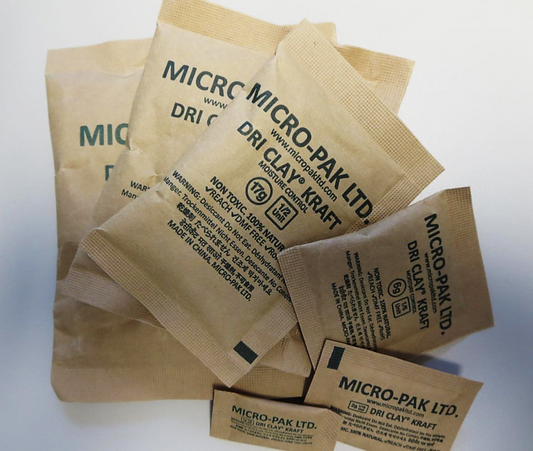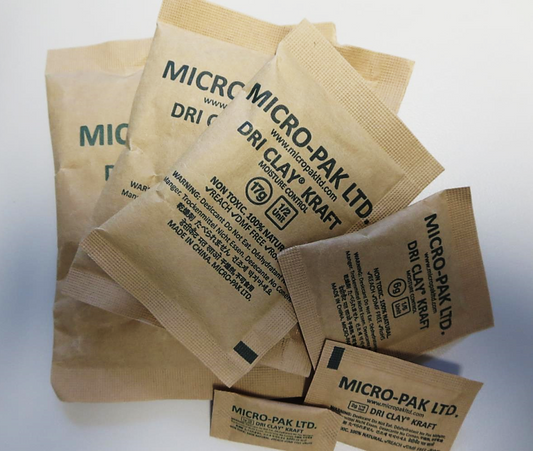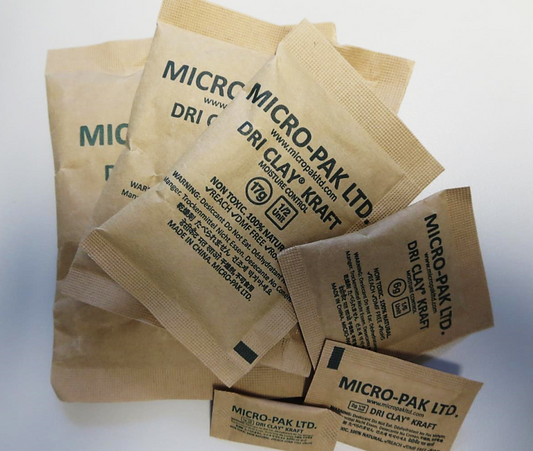MICRO-PAK® DESICCANTS PREVENT MOLD & PROTECT PET FOOD SAFETY WHILE PRESERVING THE PLANET
REDUCE PRODUCT RECALLS & SHOW CONSUMERS THAT YOU CARE ABOUT THEIR PET’S HEALTH!

How critical is pet food safety? The short answer is very critical. If there’s one thing America absolutely adores, it’s our pets, specifically dogs. As of 2022, 44.5% of U.S. households own dogs, and with 90% of American households considering their dogs as part of the family, a healthy and balanced diet has become an integral component to pet care.
With a heightened awareness of pet deaths stemming from poor quality food, consumers are scrutinizing commercially bagged food more than ever. Instead a growing segment of owners are opting to home cook meals instead.
POSITIVE IMPACT
If you’re a premium pet food manufacturer or packaging engineer looking to maximize your brand or gain market, then you absolutely should consider implementing these effective, inexpensive all natural Micro-Pak® Dri Clay® Kraft moisture absorber packets into your secondary packaging operation!
For a few pennies, these little packets can provide a big boost your brand and leave a positive, lasting impression. Why desiccants or moisture absorbers aren’t a staple within the pet food industry remains a complete mystery for this writer. After all, these small moisture absorbing packets are found in virtually every item we buy from food to pharma to consumer goods and a logical choice to ensuring the quality of pet food.
HEALTH THREATS
When pet owners think about the things that can cause harm or kill a dog, the typical list of suspects might include moving vehicles, venomous snakes or eating something poisonous. Many don’t suspect their commercial dog food as a potential culprit. However, every year, thousands of our beloved dogs are made sick or even die from eating food that’s gone bad, and one of the most likely causes is toxic mold or mycotoxins. Mycotoxins are typically caused by food being stored in warm, damp conditions and they’re stable enough to survive food processing. One recent study found that as many as 78% of animal feed was infested with mycotoxins.
WHAT CAUSES MYCOTOXINS
Temperature swings from hot to cold can cause moisture to develop in a food bag or plastic tub especially as they travel along supply chains. Moisture, in combination with heat, can trigger the growth of molds, and toxins may develop in the food. Sometimes the bag will have mold in it before it leaves the manufacturing plant. This is usually due to an error during the manufacturing process and these mishaps can often trigger costly large-scale dog food recalls that set consumers into a panic all over the country.
PRESERVE, PROLONG & PROTECT
Used in commercial applications to prolong and preserve product quality along supply chains, Micro-Pak Dry Clay desiccants regulate moisture content within sealed contents to prevent the spread of dangerous mold.
Made with all natural bentonite clay packaged in a sustainable Kraft paper, these bleach-free, plastic-free and FSC (Forest Stewardship Council) certified biodegradable (per ASTM D5511 and ISO 15985) desiccant packs meet US FDA requirements for contact with food. Micro-Pak Dri Clay® desiccants are available in five sizes to fit your packaging specifications, allowing you to regulate or eliminate moisture economically while reducing micro-plastics found in traditional desiccants.
Sizes:
SUSTAINABLE FEATURES
Micro-Pak Dri Clay® all natural desiccant packets are environmentally responsible, non-toxic and can be safely disposed in landfill where clay is returned to the earth in its natural state. Featuring water-based inks and adhesives, Dri Clay® does not release harmful or toxic chemicals into the soil nor does it contaminate water systems. The production processes require zero chemical inputs or additives, as well as low energy and low water consumption resulting in a small carbon footprint.
Reduce costly product recalls and the extend shelf life of your feed product while preserving the planet by incorporating Micro-Pak Dri Clay® all natural, plastic-free biodegradable desiccants. Appreciated by consumers, implement these high-performing biodegradable bentonite clay desiccant packets to your active packaging processes today.





